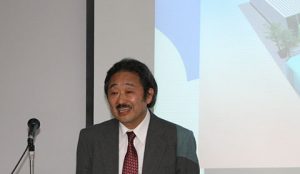
オーディオ
ダウンロード
場所
Deutsches Institut für Japanstudien
Jochi Kioizaka Bldg. 2F
7-1 Kioicho, Chiyoda-ku
Tokyo 102-0094, Japan
Tel: 03 – 3222 5198, Fax: 03 – 3222 5420
アクセス
登録情報
The lecture will be given in English. It will take place on Thursday, October 18th 2012 at 6.30 p.m. at the DIJ.
Admission is free but please register by email with: forum@dijtokyo.org
Sustainable Development, Frontier of Business, and its Application to Tohoku
2012年10月18日 / 6.30 P.M.
Yoshitaka Okada, Sophia University, Faculty of Liberal Arts
We have been witnessing new trends of business activities. One of them is involving those who are lacking resources. The best example is poverty-reducing business (base of the pyramid = BOP) in developing countries. In the past, businesses involving the poor were too risky and costly to make any profit. Then, why did firms come to engage in such activities? I argue that firms came to successfully develop viable business models to reduce risks and transaction costs. This transformation involved a sequence of diverse changes, starting with those in socio-economic values, such as sustainable development, triple bottom line, and human security in the 80s and the 90s, and then advancing to the development of new institutions, which functioned to reduce risks and transactions costs. BOP business models are the natural outcome, making use of such transformation. But this transformation is made possible by using such methods as:
- a multi-stakeholder approach with complementary and cross-boundary collaboration among firms, NGOs and international organizations;
- a good governance approach based on equality, transparency and accountability; and
- an action-oriented and appropriate approach based on the rationality of stakeholders.
I shall give some examples of how BOP businesses operate in India. Then, for the recovery and reconstruction of disaster-stricken Tohoku area, I have developed a few projects in which I apply similar concepts and tools as a coordinator of multi-stakeholders based on local rationality. In a country where business activities for those who are lacking resources are not important, I shall try to see how institutional substitutes are made and who actors are.
Yoshitaka Okada is Professor and Dean at Sophia University, Faculty of Liberal Arts. His main area of specialization is the socio-economics of development and innovation, covering such issues as technology transfer, the national innovation system, and the management system in Japan as well as corporate social responsibility (CSR) and BOP in developing countries. He was a visiting scholar to conduct research on high-tech industries at University of Wisconsin-Madison (1998), Cambridge and Oxford Universities (2001), the Max-Planck Institute-Cologne (2008), and other institutions.